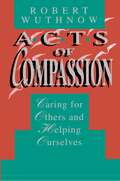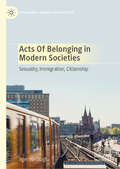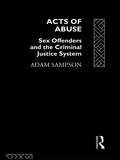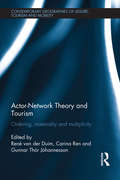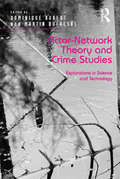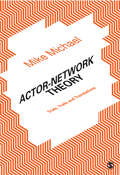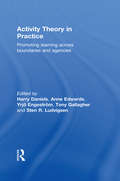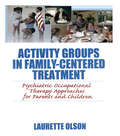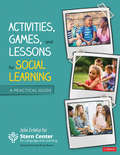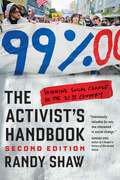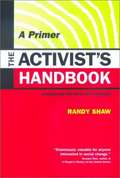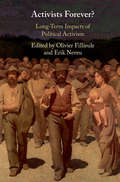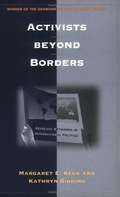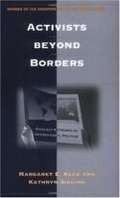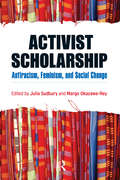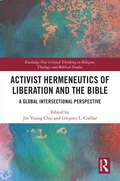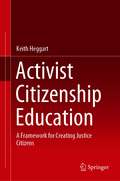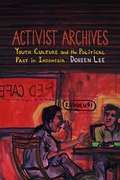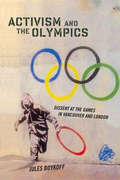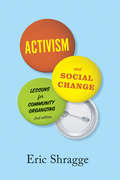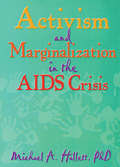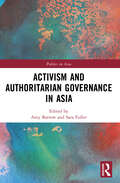- Table View
- List View
Acts of Consciousness
by Guy SaundersDrawing on compelling material from research interviews with former hostages and political prisoners, Guy Saunders reworks three classic thought experiment stories: Parfit's 'Teleporter', Nagel's 'What is it like to be a bat?' and Jackson's 'Mary the colour scientist' to form a fresh look at the study of consciousness. By examining consciousness from a social psychology perspective, Saunders develops a 'cubist psychology of consciousness' through which he challenges the accepted wisdom of mainstream approaches by arguing that people can act freely. What makes 'cubist psychology' is both the many examples taken from different viewpoints and the multiple ways of looking at the key issues of person, mind and world. This is a unique and engaging book that will appeal to students and academics in the field of consciousness studies and other readers with an interest in consciousness.
Acts of Compassion: Caring for Others and Helping Ourselves
by Robert WuthnowRobert Wuthnow finds that those who are most involved in acts of compassion are no less individualistic than anyone else--and that those who are the most intensely individualistic are no less involved in caring for others.
Acts of Belonging in Modern Societies: Sexuality, Immigration, Citizenship (Citizenship, Gender and Diversity)
by Ilgın YörükoğluThis book examines the ways in which the need to belong manifests itself in the post 9/11 world, from a cross-disciplinary perspective. Using queer Turkish women in Berlin as its subjects, the book shows how individuals with seemingly contradictory belongings develop strategies of emotional survival in the face of conflict, which Yorukoglu terms “acts of belonging”. It studies the impact of populist discourses on minorities, exploring concepts such as security, integration, sexual tolerance and cohesion within a causal relationship. Questioning this assumed relationship, the book proposes an alternative approach to study belonging. Acts Of Belonging in Modern Societies supports the empirical research behind the argument that cohesion is not a "sine qua non" of belonging. These acts allow the individual to claim belonging in spite of possible differences. The book provides evocative case studies to reveal the affective, dynamic, complex nature of human connectedness.
Acts of Abuse: Sex Offenders and the Criminal Justice System
by Adam SampsonSexual crime is a topic of massive public concern. Yet the debate over its causes and the appropriate responses of the criminal justice system is often fuelled by ignorance and prejudice, with little understanding of the reality of sexual crime.Acts of Abuse explores the response of the criminal justice system to this important issue. Its author, Adam Sampson, examines the existing research about the causes of rape and child abuse, the number of offences being committed, and the policy of the courts. He then examines in detail the responses of the probation service and the prison system to the increased number of offenders with which they are being required to deal.Written by a prominent critic of the British penal system, this is the first comprehensive survey of the phenomenon of sexual crime in the British penal context. It will appeal to students and all those with an interest in issues relating to crime and justice.
Actor-Network Theory and Tourism: Ordering, Materiality and Multiplicity (Contemporary Geographies of Leisure, Tourism and Mobility)
by René van der Duim Carina Ren Gunnar Thór JóhannessonThe recent surfacing of actor-network theory (ANT) in tourism studies correlates to a rising interest in understanding tourism as emergent thorough relational practice connecting cultures, natures and technologies in multifarious ways. Despite the widespread application of ANT across the social sciences, no book has dealt with the practical and theoretical implications of using ANT in Tourism research. This is the first book to critically engage with the use of ANT in tourism studies. By doing so, it challenges approaches that have dominated the literature for the last twenty years and casts new light on issues of materiality, ordering and networks in tourism. The book describes the approach, its possibilities and limitations as an ontology and research methodology, and advances its use and research in the field of tourism.The first three chapters of the book introduce ANT and its key conceptual premises, the book itself and the relation between ANT and tourism studies. Using illustrative cases and examples, the subsequent chapters deal with specific subject areas like materiality, risk, mobilities and ordering and show how ANT contributes to tourism studies. This part presents examples and cases which illustrate the use of the approach in a critical way. Inherently, the study of tourism is a multi-disciplinary field of research and that is reflected in the diverse academic backgrounds of the contributing authors to provide a broad post-disciplinary context of ANT in tourism studies. This unique book, focusing on emerging approaches in tourism research, will be of value to students, researchers and academics in tourism as well as the wider Social Sciences.
Actor-Network Theory and Crime Studies: Explorations in Science and Technology
by Dominique Robert Martin DufresneDeveloped by Bruno Latour and his collaborators, actor-network theory (ANT) offers crimes studies a worthy intellectual challenge. It requires us to take the performativity turn, consider the role of objects in our analysis and conceptualize all actants (human and non-human) as relational beings. Thus power is not the property of one party, but rather it is an effect of the relationships among actants. This innovative collection provides a series of empirical and theoretical contributions that shows: ¢ The importance of conceptualizing and analyzing technologies as crucial actants in crime and crime control. ¢ The many facets of ANT: its various uses, its theoretical blending with other approaches, its methodological implications for the field. ¢ The fruitfulness of ANT for studying technologies and crime studies: its potential and limitations for understanding the world and revamping crime studies research goals. Students, academics and policy-makers will benefit from reading this collection in order to explore criminology-related topics in a different way.
Actor-Network Theory: Trials, Trails and Translations
by Mike MichaelIn this thought-provoking and engaging book, Mike Michael brings us a powerful overview of Actor-Network Theory. Covering a breadth of topics, Michael demonstrates how ANT has become a major theoretical framework, influencing scholarly work across a range of fields. Critical and playful, this book fills a notable gap in the literature as Michael expertly explicates the theory and demonstrates how its key concepts can be applied. Comparing and contrasting ANT with other social scientific perspectives, Michael provides a robust and reflexive account of its analytic and empirical promise. A perfect companion for any student of Science and Technology Studies, Sociology, Geography, Management & Organisation Studies, Media & Communication, and Cultural Studies.
Actor-Network Theory: Trials, Trails and Translations
by Mike MichaelIn this thought-provoking and engaging book, Mike Michael brings us a powerful overview of Actor-Network Theory. Covering a breadth of topics, Michael demonstrates how ANT has become a major theoretical framework, influencing scholarly work across a range of fields. Critical and playful, this book fills a notable gap in the literature as Michael expertly explicates the theory and demonstrates how its key concepts can be applied. Comparing and contrasting ANT with other social scientific perspectives, Michael provides a robust and reflexive account of its analytic and empirical promise. A perfect companion for any student of Science and Technology Studies, Sociology, Geography, Management & Organisation Studies, Media & Communication, and Cultural Studies.
Activity Theory in Practice: Promoting Learning Across Boundaries and Agencies
by Anne Edwards Harry Daniels Yrjö Engeström Tony Gallagher Sten R. LudvigsenThis ground-breaking book brings together cutting-edge researchers who study the transformation of practice through the enhancement and transformation of expertise. This is an important moment for such a contribution because expertise is in transition - moving toward collaboration in inter-organizational fields and continuous shaping of transformations. To understand and master this transition, powerful new conceptual tools are needed and are provided here. The theoretical framework which has shaped these studies is Cultural Historical Activity Theory (CHAT). CHAT analyses how people and organisations learn to do something new, and how both individuals and organisations change. The theoretical and methodological tools used have their origins in the work of Lev Vygotsky and A.N. Leont’ev. In recent years this body of work has aroused significant interest across the social sciences, management and communication studies. Working as part of an integrated international team, the authors identify specific findings which are of direct interest to the academic community, such as: the analysis of vertical learning between operational and strategic levels within complex organizations; the refinement of notions of identity and subject position within CHAT; the introduction of the concept of ‘labour power’ into CHAT; the development of a method of analysing discourse which theoretically coheres with CHAT and the design of projects. Activity Theory in Practice will be highly useful to practitioners, researchers, students and policy-makers who are interested in conceptual and empirical issues in all aspects of ‘activity-based’ research.
Activity Groups in Family-Centered Treatment: Psychiatric Occupational Therapy Approaches for Parents and Children
by Laurette OlsonGet the tools for practical family-based interventions for children or adolescents with mental illness Providing parent-child occupation-based interventions can be one of the most important therapeutic services offered to children or parents with mental illness and their families. Activity Groups in Family-Centered Treatment: Psychiatric Occupational Therapy Approaches for Parents and Children provides useful in depth "how to" strategies into the processes of providing family occupation-based group intervention when a child has a mental illness. Occupational therapists working with children or parents with mental illness can learn valuable practical interventions to apply in their own clinical work.Cherished activities that strengthen parent-child bonds are many times lacking in families that include a child or parent with mental illness. Activity Groups in Family-Centered Treatment describes valuable parent-child occupation-based interventions with detailed examples of how they have been provided in therapy. This text provides an overview of the literature related to providing family-based psychiatric OT treatment for children and their families, a framework for providing services, rich descriptions of a parent-child activity group, a parent-adolescent activity group, and case studies of inpatient and home-based occupation based interventions.Topics in Activity Groups in Family-Centered Treatment include: an overview of theory and research literature on the nature of the interaction between parents and children with emotional disorders detailed case studies of family challenges with mental illness a framework for parent-child activity groups a qualitative study of a parent-child activity group analysis of the barriers that can arise in a parent-child activity group clinical experiences leading a parent-adolescent activity group analysis of the influences of culture within a parent-child activity group a case study of the intervention for a depressed mother and her family issues between parents and professionals when children are psychiatrically hospitalizedActivity Groups in Family-Centered Treatment provides occupational therapists and other professionals who lead parent-child groups or who work with families that include a child or parent with mental illness with integral tools to effectively treat their clients.
Activities, Games, and Lessons for Social Learning: A Practical Guide
by Stern Center for Language and LearningIn these games, the prize is success in school—and life. Having good social skills doesn’t just affect classroom behavior—it’s the key to making learning stick. When students improve their self-regulation, social communication, and perspective-taking competencies, they are better prepared to challenge themselves academically, take on tough tasks, and collaborate with teachers and classmates to achieve real, lasting school success. And since these skills also improve life outside school, the benefits come full circle. Designed for both explicit instruction and "learning by doing," this practical guide provides hands-on activities that are easily adapted into any curriculum and can be used in general education, special education, after-school settings, and in the home. The design of each game keeps kids engaged and motivated, while educators benefit from clear, thorough explanations that unpack the complexities of social learning. Other behind-the-scenes features include: Evidence-based, teacher-tested lessons Anecdotes and real-world examples Links to relevant research Expansion ideas for applying learned skills to broader situations Templates and reproducibles for easy implementation This curated collection of activities puts social-learning theory into practice, helping even the most challenging children develop the social skills necessary for real success in school—and beyond.
Activities, Games, and Lessons for Social Learning: A Practical Guide
by Stern Center for Language and LearningIn these games, the prize is success in school—and life. Having good social skills doesn’t just affect classroom behavior—it’s the key to making learning stick. When students improve their self-regulation, social communication, and perspective-taking competencies, they are better prepared to challenge themselves academically, take on tough tasks, and collaborate with teachers and classmates to achieve real, lasting school success. And since these skills also improve life outside school, the benefits come full circle. Designed for both explicit instruction and "learning by doing," this practical guide provides hands-on activities that are easily adapted into any curriculum and can be used in general education, special education, after-school settings, and in the home. The design of each game keeps kids engaged and motivated, while educators benefit from clear, thorough explanations that unpack the complexities of social learning. Other behind-the-scenes features include: Evidence-based, teacher-tested lessons Anecdotes and real-world examples Links to relevant research Expansion ideas for applying learned skills to broader situations Templates and reproducibles for easy implementation This curated collection of activities puts social-learning theory into practice, helping even the most challenging children develop the social skills necessary for real success in school—and beyond.
The Activist's Handbook
by Randy ShawIn this thoroughly revised and updated edition of The Activist's Handbook, Randy Shaw's hard-hitting guide to winning social change, the author brings the strategic and tactical guidance of the prior edition into the age of Obama. Shaw details how activists can best use the Internet and social media, and analyzes the strategic strengths and weaknesses of rising 21st century movements for immigrant rights, marriage equality, and against climate change. Shaw also highlights increased student activism towards fostering greater social justice in the 21st century. The Activist's Handbook: Winning Social Change in the 21st Century details the impact of specific strategies on campaigns across the country, from Occupy Wall Street to battles over sweatshops, the environment, AIDS policies, education reform, homelessness, and more: How should activists use new media tools to expose issues and mobilize grassroots support? When should activists form coalitions, and with whom? How are students--be they DREAMers seeking immigration reform or college activists battling ever-increasing tuition costs--winning major campaigns? Whether it's by inspiring "fear and loathing" in politicians, building diverse coalitions, using ballot initiatives, or harnessing the media, the courts, and the electoral process towards social change, Shaw--a longtime activist for urban issues--shows that with a plan, positive change can be achieved. In showing how people can win social change struggles against even overwhelming odds, The Activist's Handbook is an indispensable guide not only for activists, but for anyone interested in the future of progressive politics in America.
The Activist's Handbook: A Primer (Updated edition)
by Randy ShawStrategies on how to win grass roots campaigns by developing proactive agendas and making sound decisions, with many examples of successful campaigns. As campaigns increasingly require building coalitions among diverse, multi-issue constituencies, the skill of ensuring good process both internally and externally is even more vital.
Activists Forever?: Long-Term Impacts of Political Activism (Cambridge Studies in Contentious Politics)
by Olivier Fillieule Erik NeveuActivists Forever? explores the consequences of political involvement on an individual's life. While much of the research in this area has focused on the motivations of entire protests groups, the editors of this volume propose an approach that focuses on actors. This book examines political involvement's socio-biographical effects, or the ways in which political commitment generates or modifies dispositions to act, think, and perceive, in a way that is either consistent with or in contrast to the results of previous socialization. The contents explore what political involvement leads to rather than what causes involvement. Using a variety of case studies, this collection of essays provides global coverage with a focus on participation in major protests in the 1960s and significantly broadens our understanding by looking outside the United States. These essays look at the lasting effects of activists' knowledge, connections, and symbolic capital on their future participation in politics, as well as their personal and professional lives.
Activists Beyond Borders: Advocacy Networks in International Politics
by Margaret E. Keck Kathryn SikkinkSurvey of non-governmental organizations' role in pressing for improvements in areas such as human rights, environmental stewardship and more.
Activists beyond Borders
by Margaret E. Keck Kathryn SikkinkA masterful combination of emerging theory and empirical comparison of one of the most intriguing areas of transnational politics. Keck and Sikkink access a broad range of theory from social movements, international relations, and comparative politics research to glean from a wealth of their own research findings solid and thought-provoking conclusions about the most interesting and least well-understood area of contentious politics in the world today. -Sidney Tarrow, Cornell University (Government) "Activists beyond Borders is a searching exploration of advocacy networks, providing compelling accounts in areas such as human rights and environmental protection and an intriguing glimpse into the transnational politics of the twenty-first century. "-Robert O. Keohane, Duke University Margaret E. Keck and Kathryn Sikkink examine a type of pressure group that has been largely ignored by political analysts: networks of activists that coalesce and operate across national frontiers. Their targets may be international organizations or the policies of particular states. Historical examples of such transborder alliances include anti-slavery and woman suffrage campaigns. In the past two decades, transnational activism has had a significant impact in human rights, especially in Latin America, and advocacy networks have strongly influenced environmental politics as well. The authors also examine the emergence of an international campaign around violence against women.
Activist Scholarship: Antiracism, Feminism, and Social Change
by Julia Sudbury Margo Okazawa-ReyCan scholars generate knowledge and pedagogies that bolster local and global forms of resistance to U.S. imperialism, racial/gender oppression, and the economic violence of capitalist globalization? This book explores what happens when scholars create active engagements between the academy and communities of resistance. In so doing, it suggests a new direction for antiracist and feminist scholarship, rejecting models of academic radicalism that remain unaccountable to grassroots social movements. The authors explore the community and the academy as interlinked sites of struggle. This book provides models and the opportunity for critical reflection for students and faculty as they struggle to align their commitments to social justice with their roles in the academy. At the same time, they explore the tensions and challenges of engaging in such contested work.
Activist Hermeneutics of Liberation and the Bible: A Global Intersectional Perspective (Routledge New Critical Thinking in Religion, Theology and Biblical Studies)
by Jin Young Choi Gregory L. CuéllarInspired by the current political moment around the globe in which uprisings, protests, revolutions, and movements are on the rise, this book examines the intersections between the Bible and activism. It does this by showcasing intersectional readings of the Bible as an activist act and a tool for activism; historicizing the uses of the Bible within activist/freedom movements around the globe; and offering activist approaches to teaching the Bible.Each chapter in this volume provides a critical and substantive response from the discipline of Biblical Studies to global political trends. International in scope, with contributors from Africa, Asia, Caribbean, Europe, Latin America, Oceania and the United States, they address themes such as gender politics, racial injustices, violence toward women, political resistance, and activist hermeneutics and pedagogies. Together they harness the intellectual energies of minoritized Biblical scholars in a nonessentialist manner to reflect on the Bible as a tool for liberating social and political change. Reflecting on the activist potential of the Bible, this book will be of keen interest to scholars in Biblical Studies, Political Theology, and Religious Studies.
Activist Citizenship Education: A Framework for Creating Justice Citizens
by Keith HeggartThis book explores alternative models of civics and citizenship education. Specifically, it uses Justice Citizens, a participatory research and film-making project, as a tool to examine young people’s ideas about active citizenship and participation in public spaces. It introduces a framework that seeks to explore the diverse and apparently contradictory nature of young people’s active citizenship. The framework draws on complexity theory combined with critical pedagogy and democratic education to formulate an approach to developing active citizenship among young people. This approach extends theories of both critical pedagogy and education for citizenship, and by doing so seeks to explain the variegated nature of young people’s engagement with civil society. This book contains a valuable repository of ideas and resources for application for teachers to use in schools and classrooms. Academics engaged in initial teacher education, at both primary and secondary levels, will find the framework of use when describing the importance and new approaches to civics and citizenship education within the current school and policy environments.
Activist Archives: Youth Culture and the Political Past in Indonesia
by Doreen LeeIn Activist Archives Doreen Lee tells the origins, experiences, and legacy of the radical Indonesian student movement that helped end the thirty-two-year dictatorship in May 1998. Lee situates the revolt as the most recent manifestation of student activists claiming a political and historical inheritance passed down by earlier generations of politicized youth. Combining historical and ethnographic analysis of "Generation 98," Lee offers rich depictions of the generational structures, nationalist sentiments, and organizational and private spaces that bound these activists together. She examines the ways the movement shaped new and youthful ways of looking, seeing, and being--found in archival documents from the 1980s and 1990s; the connections between politics and place; narratives of state violence; activists' experimental lifestyles; and the uneven development of democratic politics on and off the street. Lee illuminates how the interaction between official history, collective memory, and performance came to define youth citizenship and resistance in Indonesia's transition to the post-Suharto present.
Activism and the Olympics
by Jules BoykoffThe Olympics have developed into the world's premier sporting event. They are simultaneously a competitive exhibition and a grand display of cooperation that bring together global cultures on ski slopes, shooting ranges, swimming pools, and track ovals. Given their scale in the modern era, the Games are a useful window for better comprehending larger cultural, social, and historical processes, argues Jules Boykoff, an academic social scientist and a former Olympic athlete. In "Activism and the Olympics," Boykoff provides a critical overview of the Olympic industry and its political opponents in the modern era. After presenting a brief history of Olympic activism, he turns his attention to on-the-ground activism through the lens of the Vancouver 2010 Winter Olympics and the 2012 Summer Olympics in London. Here we see how anti-Olympic activists deploy a range of approaches to challenge the Olympic machine, from direct action and the seizure of public space to humor-based and online tactics. Drawing on primary evidence from myriad personal interviews with activists, journalists, civil libertarians, and Olympics organizers, Boykoff angles in on the Games from numerous vantages and viewpoints. Although modern Olympic authorities have strived--even through the Cold War era--to appear apolitical, Boykoff notes, the Games have always been the site of hotly contested political actions and competing interests. During the last thirty years, as the Olympics became an economic juggernaut, they also generated numerous reactions from groups that have sought to challenge the event's triumphalism and pageantry. The 21st century has seen an increased level of activism across the world, from the Occupy Movement in the United States to the Arab Spring in the Middle East. What does this spike in dissent mean for Olympic activists as they prepare for future Games?
Activism and Social Change: Lessons For Community And Local Organizing
by Eric ShraggeDrawing on over thirty years of experience in community development practice, Eric Shragge offers a unique historical perspective on activism, linking various forms of local organizing to the broader goal of fundamental social change. This new edition places contemporary community organizing in a post-9/11 context and includes a discussion of national and international organizing efforts—in the Middle East, in the Occupy movement, in European resistance to austerity measures, and in recent student protests in Quebec. A new chapter-length case study covering Shragge's long-term involvement with the Immigrant Workers Centre in Montreal offers one of the few English-language discussions of community organizing in Quebec. Activism and Social Change is an excellent core or supplementary text in courses on social movements, community organizing, or community development.
Activism and Marginalization in the AIDS Crisis
by Michael A HallettActivism and Marginalization in the AIDS Crisis shows readers how the advent of HIV-disease has brought into question the utility of certain forms of “activism” as they relate to understanding and fighting the social impacts of disease. This informative and powerful book is centrally concerned about the ways in which institutionally governed social constructions of HIV/AIDS affect policy and public images of the disease more so than activist efforts. It asserts that an accounting of the power institutional structures have over the dominant social constructions of HIV disease is fundamental to adequate forms of present and future AIDS activism. Chapters in Activism and Marginalization in the AIDS Crisis demonstrate how, despite what is thought of as the “successful activism” of the past decade, the claims of the HIV-positive are still being ignored, still being marginalized, and still being administratively “handled” and exploited even as the plight of those who find themselves HIV-positive worsens. Although chapters reject the assertion that activism has been a highly effective remedy to HIV-positive voicelessness, authors do not deny that activists have been vocal, but that they continue to be ignored despite their vocality.Contributors in Activism and Marginalization in the AIDS Crisis offer numerous examples of institutional control and demonstrate that institutional structures, and not activists, are controlling the public meaning of HIV-related issues. Readers learn how messages about HIV/AIDS are produced, negotiated, modified, and sustained through institutional mechanisms that serve mostly institutional interests rather than those of the HIV-positive. In gaining an understanding of these issues, readers will begin to learn how to modify and strengthen activist efforts with valuable insight on: the lack of HIV-positive voices in mainstream news portrayals of HIV/AIDS research on constructions of HIV-disease at the state government level social constructions and how they affect HIV/AIDS policy the political construction of AIDS and interest-based struggles the emergent “bio-politics” of HIV and homosexuality in the U.S. how institutional power works to govern public understanding of HIV diseaseInstitutional structures are defined in this book as groups engaged in and defined by the production of various “truths” which sustain them. Institutional power may be defined as the capacity to regulate, constrain, and disseminate versions of “truth.” Activism and Marginalization in the AIDS Crisis reveals how HIV activist groups have been outmaneuvered when it comes to the production and dissemination of various “truths” about HIV/AIDS by institutional structures more deeply steeped in social legitimacy and which have a superior capacity for message dissemination.HIV/AIDS activists, HIV-positive persons and those with AIDS, HIV/AIDS educators, public and institutional policymakers, health professionals, and the general public will find this book essential to understanding the social constructions of HIV/AIDS, how these affect HIV/AIDS-related policy and public opinion, and how to begin to cipher through the plethora of information to find and promote the “truth.”
Activism and Authoritarian Governance in Asia (Politics in Asia)
by Amy Barrow and Sara FullerThis interdisciplinary book offers a new analysis of the concepts, spaces, and practices of activism that emerge under diverse authoritarian modes of governance in Asia. Demonstrating the limitations of existing conceptual approaches in accounting for activism in Asia, the book also offers new understandings of authoritarian governance practices and how these shape state-civil society relations. In conjunction with its tripartite theoretical framework, the book presents regional knowledge from an array of countries in Asia, with empirically rich contributions from both scholars and activists. Through in-depth case studies, the book offers new scholarly insights that highlight the ways in which activism emerges and is contested across Asia. As such, it will be of interest to students and scholars of Asian politics, law, and sociology.

